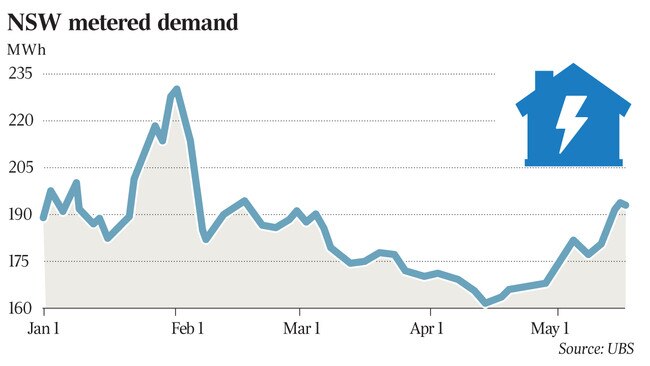Powering the future: Origin Energy reinvents itself to cope with a 21st century grid
Australia’s biggest electricity retailer is undergoing a quiet revolution.

Australia’s biggest electricity retailer is undergoing a quiet revolution.
Two decades into its life as a traditional utility serving up supplies to more than four million customers, Origin Energy says the future will increasingly be a two-way street.
“In the past you had a meter box on the side of the house, which was read once every three months and then the customer pays the bill,” Origin’s future energy executive general manager Anthony Lucas told The Australian. “And perhaps it is not that great an experience.”
Rooftop solar, batteries, electric vehicles and smart appliances are increasingly allowing households to generate, store and trade energy.
The convergence of new generation sources and the billions of data points they create means Origin is pivoting to technology solutions including artificial intelligence as it seeks to reinvent itself to meet the needs of a fast-changing electricity grid.
One signpost of its ambition was the $500m deal this month for a stake in British electricity disrupter Octopus, a fast-growing tech start-up with ambitions to become “the Amazon of energy”.

While that marked the biggest statement of intent since Frank Calabria was named chief executive in 2016, Origin has evaluated more than 2000 companies in recent years as it juggles where to partner, invest or build its own knowhow.
Origin’s future energy division now houses 200 staff and is led by Cameron Briggs from his Silicon Valley base with the team split into commercial and strategy, data and analytics, analysis and policy and regulation.
Recent deals have included a stake in data provider Intertrust and an interest in California-based start-up Cryptowek. Closer to home, Origin is in early discussions about trialling a tech innovator tapping into the fast-growing rooftop solar industry.
Melbourne’s Allume Energy, backed by property developer Mirvac, allows solar to be shared around apartment buildings, cutting costs and giving residents the chance to tap into renewables for the first time.
“People in the past have looked at the tech and tried to crack this and not really been able to,” Mr Lucas said. “We are particularly interested in Allume’s solution. It’s a segment of our customer base that hasn't traditionally been able to access solar because of the way it’s metered and shared and this goes a long way to solving that physical element.”

The connection with Allume springs from Origin’s role as a co-founder of Free Electrons, an energy innovator that seeks to pair big utilities with tech start-ups. Origin looks at three or four trials a year out of the program. “What we try to do through Free Electrons is technology we may be interested in or a business model that appeals. We’ll agree a trial or a deployment of that tech to our segment of our customer base and look at economics, the customer benefits, the experience and then if that goes we’ll look at deployment.”
Still, while Australia’s solar uptake is among the highest in the world, the shift to back-up storage is moving at a much slower pace with costs remaining prohibitive for many potential customers.
“At the moment one of the biggest challenges that we have with batteries is a longer duration that can store energy for supply for a number of days or weeks,” Mr Lucas said. “Solar just produces energy when the sun shines and the big problem the grid is having is finding demand for that sometimes in the middle of the day when batteries could help. Ultimately, we see batteries moving in the same way that solar did. Costs will continue to fall but our view is not one technology will solve the integration of lots of renewables.”
The federal government’s technology roadmap received a lukewarm response from some in the industry, partly for the sheer number of carbon-reducing options on the table. But for Origin, the blueprint, along with the market operator’s integrated system plan, show the power industry is firmly on the right track as the grid moves away from coal.
“Ultimately there will be bumps along the way but I think you’ve got a convergence of opinion at the moment that we haven’t had in the last five years which is everyone sees this is the transition,” Mr Lucas said. “I don’t speak to anyone who is in denial that this is the transition.
“In the industry people see the challenge as what type of assets we need, how they come to market and the economics. The question now is not is it needed but how does it come into a market that’s completely different to the one set up late last century.”


To join the conversation, please log in. Don't have an account? Register
Join the conversation, you are commenting as Logout